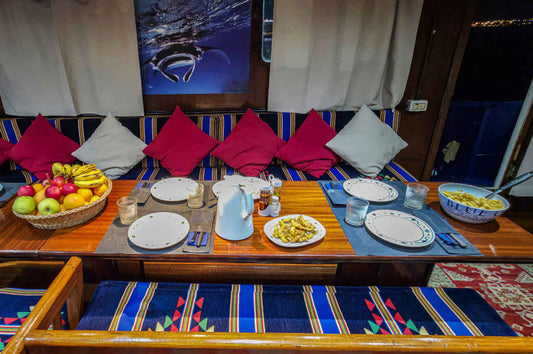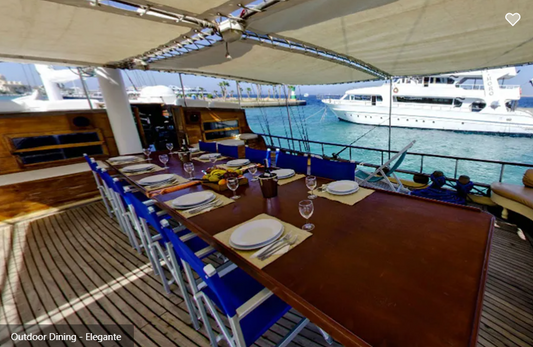
Djibouti Liveaboard Diving
Compare and book your favourite Djibouti dive liveaboard
Djibouti Liveaboards
* SDE Rating is short for "SDE Liveaboard Rating", our feature-based scoring system that rates dive liveaboards across six categories: Boat, Cabin, Diving, Food, Drinks, and Non-Diver amenities. Each category is scored out of 10 and combined to give an overall percentage rating for each dive liveaboard. Read the full description of the SDE Liveaboard Rating system
† Customer Rated is the rating given by customers on Liveaboard.com
Note: The above “Price Per Day” was correct at the time of producing this article, as was the exchange rate used to convert the GBP cost to US Dollars and Euros. For an up-to-date cost for your chosen liveaboard, please visit the booking page.
Djibouti Liveaboard Discounted Deals
Once you've found your perfect dive liveaboard, you might want to use this table of discounted liveaboard deals and last minute deals to find a great deal.
Liveaboard Diving in Djibouti, Whale sharks, volcanic reefs and a Red Sea–Indian Ocean crossroads
Eight-day safaris to quiet islands and straits, perfect for confident beginners through to experienced divers, with peak whale shark season in winter
Why choose Djibouti for a liveaboard
- Whale shark encounters. Plankton-rich water draws whale sharks from October to February, often with great snorkelling and in-water encounters.
- Frontier feel. Few boats, untouched reefs and big schooling fish over living soft corals and sponges.
- Two oceans’ influence. At the gateway between the Red Sea and Indian Ocean you get diverse species and dramatic seascapes.
- Easy rhythm. Typical itineraries run 8 days and 7 nights with about three dives per day, so you maximise water time.
Where you will dive
- Moucha Island. Close to shore, with clear water, easy-to-advanced sites and a handy check dive at the start of the trip. Includes reef dives and small wrecks for more experienced teams.
- Seven Brothers Islands (Bab-el-Mandeb Strait). Seven uninhabited islets with vibrant shallows ~5–20 m and deeper options. Expect coral gardens, a wreck, and superb wide-angle scenes for photographers.
- Gulf of Tadjourah. A broad basin at the Red Sea’s entrance. Reefs, sea walls and caves from ~5–30 m. Sharks cruise the rainbow corals, with regular reef life for relaxed dives.
- Ghoubet al Kharab (Devil’s Goblet). A dramatic bay at a tectonic junction, with very deep water nearby, strong currents at times and underwater volcanic features. Look for large fish, shark passes and the iconic site “The Crack,” descending between plate boundaries.
A typical week on board
- 3 dives most days. Weather and currents decide the order, but you will usually rotate across the Seven Brothers, Tadjourah and Ghoubet.
- Mixed encounters. Beyond whale sharks in season, year-round chances for manta rays, pilot whales, grey reef and nurse sharks, plus big schools over colourful soft corals.
- Small-group vibe. Limited operators keep sites quiet and briefings unhurried.
Who this suits
- Open Water and up. Many operators ask for Open Water certification with ~20 logged dives. Strong-current sites are matched to experience.
- Snorkellers welcome. Non-divers can join whale shark swims and reef snorkels.
- Photographers. Clear water, coral colour, volcanic backdrops and big animals.
Conditions and when to go
- Season. Liveaboards usually run October to late May or early June. July–August brings more rain, lower visibility and fewer sailings.
- Climate. Warm and humid. October–April is cooler and most pleasant topside.
Getting there and departures
- Fly to Djibouti City. Djibouti Ambouli International Airport serves routes from regional hubs and major cities.
- Embarkation. Boats typically depart from the Djibouti Marina. Transfers are short and straightforward.
Practical tips
- Bring your kit if you can. Rental is available, but your own suit, mask and regs are more comfortable.
- Paperwork. Bring your certification card and logbook. Dive insurance is strongly recommended and often required.
- Languages. French, Arabic and Somali are widely spoken. Crew commonly speak English on dive boats.
- Money. Currency is the Djiboutian Franc. Exchange rates change, so check current rates before travel.
- Power. 220 V with Type C/E plugs. Pack a suitable adaptor.
- Health. Yellow fever and typhoid vaccinations are commonly recommended. Malaria risk exists in parts of the country. Always take medical advice before travel and bring any personal meds and sea-sickness remedies.
Costs and extras
- Trip pricing. Expect mid-range nightly rates that vary by cabin, season and operator.
- Common add-ons. Rental gear if needed, marine-park or local fees where applicable, and guided-diver supplements for newer divers on advanced sites.
Why a Djibouti liveaboard is worth it
- You meet the headline act. Whale sharks in season, with mantas and sharky passes year-round.
- You dive places day boats cannot reach. Quiet straits, volcanic bays and colourful reefs with few other groups.
- You maximise water time. Three dives most days across four distinct areas, all from one easy base.
If you want warm, clear water, whale sharks and dramatic volcanic seascapes at the meeting of two oceans, Djibouti liveaboards deliver. You will dive more, avoid the crowds and come home with a very happy logbook.
-
Example product title
Vendor:VendorRegular price £19.99 GBPRegular price -
Example product title
Vendor:VendorRegular price £19.99 GBPRegular price -
Example product title
Vendor:VendorRegular price £19.99 GBPRegular price -
Example product title
Vendor:VendorRegular price £19.99 GBPRegular price
-
Example product title
Vendor:VendorRegular price £19.99 GBPRegular price -
Example product title
Vendor:VendorRegular price £19.99 GBPRegular price -
Example product title
Vendor:VendorRegular price £19.99 GBPRegular price -
Example product title
Vendor:VendorRegular price £19.99 GBPRegular price
-
Example product title
Vendor:VendorRegular price £19.99 GBPRegular price -
Example product title
Vendor:VendorRegular price £19.99 GBPRegular price -
Example product title
Vendor:VendorRegular price £19.99 GBPRegular price -
Example product title
Vendor:VendorRegular price £19.99 GBPRegular price
-
Example product title
Vendor:VendorRegular price £19.99 GBPRegular price -
Example product title
Vendor:VendorRegular price £19.99 GBPRegular price -
Example product title
Vendor:VendorRegular price £19.99 GBPRegular price -
Example product title
Vendor:VendorRegular price £19.99 GBPRegular price
-
Example product title
Vendor:VendorRegular price £19.99 GBPRegular price -
Example product title
Vendor:VendorRegular price £19.99 GBPRegular price -
Example product title
Vendor:VendorRegular price £19.99 GBPRegular price -
Example product title
Vendor:VendorRegular price £19.99 GBPRegular price
-
Example product title
Vendor:VendorRegular price £19.99 GBPRegular price -
Example product title
Vendor:VendorRegular price £19.99 GBPRegular price -
Example product title
Vendor:VendorRegular price £19.99 GBPRegular price -
Example product title
Vendor:VendorRegular price £19.99 GBPRegular price
-
Example product title
Vendor:VendorRegular price £19.99 GBPRegular price -
Example product title
Vendor:VendorRegular price £19.99 GBPRegular price -
Example product title
Vendor:VendorRegular price £19.99 GBPRegular price -
Example product title
Vendor:VendorRegular price £19.99 GBPRegular price
-
Example product title
Vendor:VendorRegular price £19.99 GBPRegular price -
Example product title
Vendor:VendorRegular price £19.99 GBPRegular price -
Example product title
Vendor:VendorRegular price £19.99 GBPRegular price -
Example product title
Vendor:VendorRegular price £19.99 GBPRegular price
-
Example product title
Vendor:VendorRegular price £19.99 GBPRegular price -
Example product title
Vendor:VendorRegular price £19.99 GBPRegular price -
Example product title
Vendor:VendorRegular price £19.99 GBPRegular price -
Example product title
Vendor:VendorRegular price £19.99 GBPRegular price



